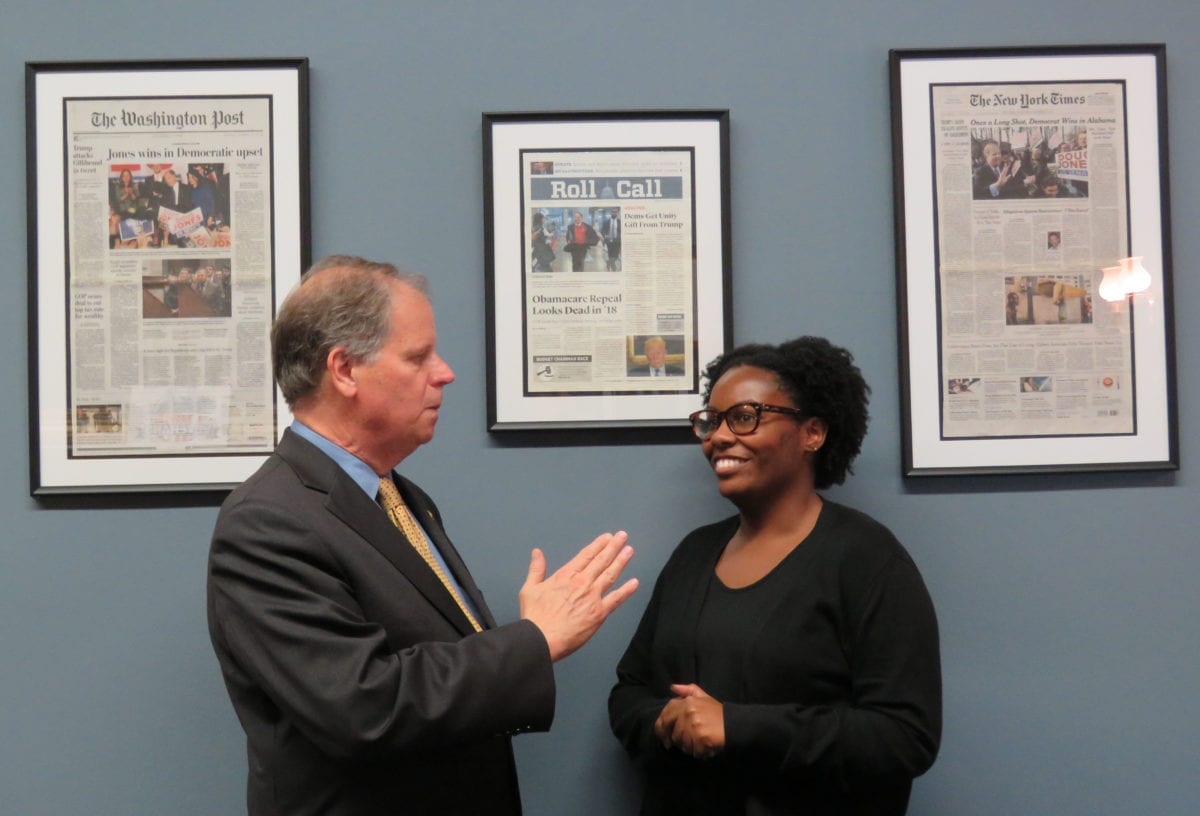Staff Report –

U.S. Senator Doug Jones of Alabama talking to a member of his staff in his office in the Russel Senate Office Building in Washington, D.C.: Glynn Wilson
Senator Doug Jones of Alabama Calls for Investigation Into VA Failure to Pay Veterans –
In response to a news report indicating that the Trump administration’s Department of Veterans Affairs claims to be so short staffed it can’t do the math to pay student veterans benefits it owes, U.S. Senator Doug Jones of Alabama drafted a letter to the senior leader overseeing GI Bill benefits at the U.S. Department of Veterans Affairs (VA) seeking answers on behalf of Alabama veterans about the department’s failure to pay thousands of veterans the GI Bill benefits they have earned.
A spokesperson for the VA indicated there was no plan to reimburse veterans who were underpaid as a result of a technical computer error, which resulted in underpaying the benefits of 360,000 veterans.
“I am gravely concerned about the impact these errors have had on the thousands of Alabama veterans and their family members who rely on the timely and predictable disbursement of GI Bill benefits,” Senator Jones wrote in his letter to VA Under Secretary for Benefits Paul Lawrence.
According to media reports, the VA said it could not make retroactive payments without auditing its previous education claims, meaning the VA would potentially have to inspect 2 million claims without the staff to do it, which it said would delay future claims.
NBC News previously reported that some veterans were forced into desperate financial straits stemming from a change in calculating housing allowances under the Forever GI Bill, which President Donald Trump signed into law in July 2017. When its computers were unable to process that change, the VA quickly faced a backlog of veterans’ claims three times higher than normal. In response, the VA had announced earlier on Wednesday that it would delay the Forever GI Bill housing allowance changes until December 2019 — and again promised that retroactive payments would be made to those who did not receive a correct amount.
But VA officials told congressional staffers in a telephone call on Wednesday morning that once the system is made right next year, they will not make retroactive payments to those who were underpaid because of the housing miscalculations.
“They are essentially going to ignore the law and say that that change only goes forward from December 2019,” one VA aide told NBC News.
VA spokesman Curtis Cashour told NBC News that the agency would delay paying housing allowances in accordance with the new Forever GI Bill until the spring term of 2020 and instead pay housing allowances based on Department of Defense’s older Basic Housing Allowance rates. Attempting to implement the law, he said, would put “an enormous administrative burden for schools in which some 35,000 certifying officials would have to track retroactively and re-certify hundreds of thousands of enrollment documents.”
Cashour did not comment on those who were underpaid, and there seems to be “rampant confusion” surrounding the issue, according to NBC. It appears to be unknown how many students have been underpaid or how many more could be underpaid because of the changes to the law and how much money these veterans are owed.
Congressional aides described the situation as “frustrating.” One, who commented on the shifting answers and constant confusion, asked, “I mean, am I taking crazy pills?”
Senator Jones indicated he had heard from a student who lost a parent in combat who had trouble collecting a tuition disbursement because of the error.
“Specifically, I am referring to cases like the one I recently heard about involving a student in my state who lost a parent in combat having to wage her own fight for several months just to have her tuition disbursement corrected,” Jones said. “While this student’s case was resolved favorably and her financial good standing restored after several anxiety-filled months, I am told that there may be thousands of other similar cases still pending in Alabama.”
Jones’ letter requests Alabama-specific information from the VA about the impact of these errors on veterans and their families in the state, in addition to more details on the agency’s plans to fix the problem and make the impacted beneficiaries whole again.
Senator Jones also joined his colleagues today in a bipartisan letter, led by Senators Brian Schatz,a Democrat from Hawaii, and John Boozman, a Republican from Arkansas, in calling on the VA Inspector General to launch an investigation into allegations that the VA would not be reimbursing veterans for any missed or underpaid benefits.
In their letter, the lawmakers ask about how the technical errors occurred, how quickly any reimbursements will be made, and how the VA plans to make sure all benefits will continue to be paid out without interruption.
VA Under Secretary for Benefits Paul Lawrence is scheduled to testify Thursday morning before the House Committee on Veterans’ Affairs. One of the committee aides said that members of Congress will attempt to clear this issue up before they move forward with the hearing.
Full text of Senator Jones’ letter to Under Secretary Lawrence
November 30, 2018
The Honorable Paul R. Lawrence, Ph.D.
Under Secretary for Benefits
Department of Veterans Affairs
810 Vermont Avenue, NW
Washington, D.C. 20571
Dear Dr. Lawrence,
I am writing to request information on the impact on Alabama veterans and their families of ongoing problems with the administration of housing benefits during delayed implementation of the Harry W. Colmery Veterans Education Assistance Act (P.L. 115-48), known as the “Forever GI Bill.” I have joined my colleagues in calling for the VA to make whole each and every veteran for missed and incorrect housing payments stemming from technical problems and related computer software issues. However, I have additional questions about the caseload in Alabama and the VA’s plans for working with college administrators to resolve each case in a timely manner and correctly administer these benefits going into the Spring 2019 school semester.
I am gravely concerned about the impact these errors have had on the thousands of Alabama veterans and their family members who rely on the timely and predictable disbursement of GI Bill benefits. Specifically, I am referring to cases like the one I recently heard about involving a student in my state who lost a parent in combat having to wage her own fight for several months just to have her tuition disbursement corrected. While this student’s case was resolved favorably and her financial good standing restored after several anxiety-filled months, I am told that there may be thousands of other similar cases still pending in Alabama.
While statements made this week by VA officials in Congressional testimony indicate that the VA does intend to reimburse veterans for missed or underpaid housing payments—despite previous statements to the contrary—it remains unclear whether the VA will do so at the rates that beneficiaries are legally entitled to beginning August 1, 2018, or if the VA only intends to make veterans whole based on the rates as they existed before the law took effect, thereby remaining in violation of existing law. Any re-payments that are not in compliance with current law would be unacceptable and would send a disturbing message to our military service members, veterans, and their families.
I ask that you please provide me with the following information so that we may work to address remaining issues in Alabama in a timely fashion:
1. How many students are enrolled using GI Bill benefits on Alabama campuses?
2. Can you provide me with a breakdown of the number of GI Bill benefit recipients per Alabama college itemized by college?
3. How many cases of incorrect housing payments on each campus have been logged in Alabama since August 1, 2018?
4. How many of these cases have already been resolved and how many of them have received full compensation for retroactive benefits dating back to August 1?
5. Who is the appropriate contact at each university for students that have questions about how to resolve problems with incorrect disbursements?
6. Do you expect the remaining cases of underpayment to be made whole with retroactive payments before these students begin the Spring 2019 school semester?
7. Do you expect the technical problem to be corrected before the beginning of the Spring 2019 school semester?
8. What additional resources do you need so that the VA may fully comply with the program’s guidelines in a timely manner going into the new academic year?
Thank you for your attention to this urgent matter. I appreciate the work that you do to support our nation’s veterans, and especially the survivors of those who made the ultimate sacrifice.
Please keep me updated on the progress of the caseload in Alabama. I hope to work with you and the VA to ensure this issue is addressed as soon as possible.
Sincerely,
Doug Jones
United States Senator














Another example of “WE” support our veterans manure…actually we really support those who found deferments and avoided military service altogether!